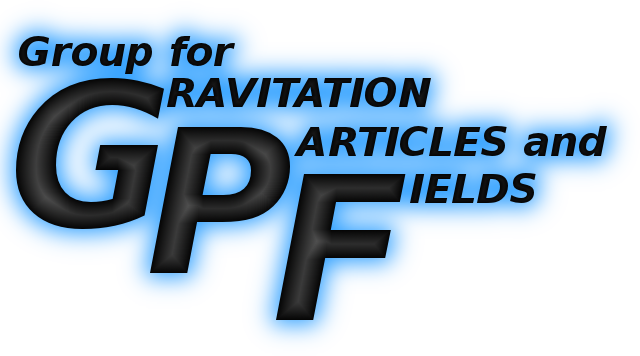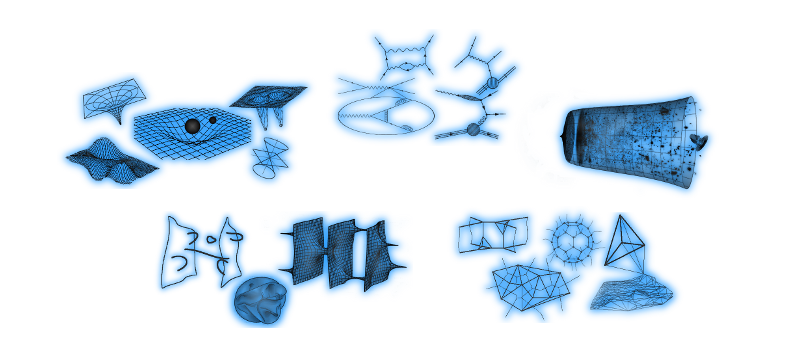


Seminars for the year:
2025
2024
2023
2022
2021
2020
2019
2018
2017
2016
2015
2014
2013
2012
2011
2010
2009
2008
2007
Follow our seminars online via: GPF BigBlueButton server
Time: 19. November 2010, 11:00h
Place: Institute of Physics, room 300
Speaker: Dusko Latas
Title: On renormalizability of noncommutative Standard Model
Abstract:
Noncommutative Standard Model represents a generalization of the Standard Model of elementary particles. It is formulated on a noncommutative space with a goal to describe the quantum structure of spacetime and therefore of gravity. In this theory coordinates are operators, and their commutator is proportional to a constant $\theta^{\mu\nu}$, which fixes the noncommutative scale. The space of noncommutative coordinates can be represented as a space of commutative coordinates with a modified product rule. In this seminar we will show how to define fields and their interactions on this space. Since the noncommutativity constant is small, one can calculate perturbatively, thus obtaining a local theory with a finite number of parameters, so it is important to investigate its renormalizability. In $\theta$-linear expansion we will demonstrate the properties of boson and fermion sector of the Standard Model.
Time: 4. October 2010, 11:00h
Place: Faculty of Physics, room 661
Speaker: Marko Simonovic
Title: Cosmological models in f(R) theories of modified gravity --- numerical approach
Abstract:
This lecture will present some simplest models of modified theories of gravity and their application to modelling of the inflation and accelerated expansion of the Universe. Special attention will be devoted to numerical solutions of the modified Friedmann equations. We shall present methods for solving of the direct and inverse problem and testing the integrators for the case of the Starobinski inflation.
Time: 24. September 2010, 11:00h
Place: Institute of Physics, room 300
Speaker: Hans Hansson
Title: Quantum Hall Fluids, Conformal Field Theory and Non-Abelian Fractional Statistics
Abstract:
Two-dimensional conformal field theories (CFTs) are important tools in the theoretical description of quantum Hall (QH) fluids. Since CFTs normally describe critical systems this is at first sight rather surprising. I will explain how it comes about, after giving a short primer on QH fluids and their quasiparticle excitations. The most striking prediction of the CFT approach to QH physics is that the observed state at filling fraction 5/2 might support quasiparticles obeying non-abelian fractional statistics. I will explain what is meant by this, and why it has attracted so much interest.
Time: 27. August 2010, 11:00h
Place: Institute of Physics, room 300
Speaker: Aleksandar Mikovic
Title: 2-BF gauge theories
Abstract:
We describe a construction of a gauge invariant action for a 2-BF theory, which is a generalization of the BF theories where a 2-form gauge field is present. The essential ingredient in the construction is the 2-Lie group, which is a generalization of the usual Lie group.
Time: 28. May 2010, 10:00h
Place: Institute of Physics, room 300
Speaker: Marko Vojinovic
Title: Large-spin asymptotics of the ELQG wavefunctions
Abstract:
We provide a detailed analysis of ELQG wavefunctions constructed from the 6j-sybmols and calculate large-spin asymptotic behaviour. After a sequence of reasonable and plausible approximations of the wavefunction, we come to the result that asymptotics does *not* have the form required for the graviton propagator in the classical limit. This is an unexpected result, and can be formulated as a no-go theorem.
Time: 14. May 2010, 10:00h
Place: Institute of Physics, room 300
Speaker: Nenad Manojlovic
Title: Generalized Schur Weyl duality and symmetries of integrable spin chains
Abstract:
Quantum integrable spin chains usually have an underlying dynamical symmetry algebra. This can be just a Lie algebra, for isotropic models, or a quantum group, for anisotropic spin chains. Since corresponding Hamiltonians commute with global generators of the symmetry algebra, they belong to a centralizer algebra of the symmetry algebra. In many cases these two algebras give multiplicity free decomposition of the state space into irreducible representations of these algebras. As a consequence one gets the structure of the multiplets and degeneracy of the spectra of the Hamiltonians. Examples of the centralizer algebras are: group algebra of the symmetric group, its deformation - Hecke algebra, the Brauer algebra and its deformation - Birman-Wenzl-Murakami algebra.
Time: 30. April 2010, 11:30h
Place: Institute of Physics, room 300
Speaker: Suresh Nampuri
Title: Issues and Aspects of Counting Dyonic Black Holes in N=4 String Theory
Abstract:
In the last decade, significant progress has been made in the understanding of the entropy of suspersyymetric dyonic black holes in N=4 string theory. I will review some of this work and also talk about ideas in counting entropy of non-supersymmetric black holes and its relation to the recent work on counting the entropy of the Kerr black hole.
Time: 30. April 2010, 10:00h
Place: Institute of Physics, room 300
Speaker: Arthemy Kiselev
Title: Towards the variational quantization of strings, or "Give us the tools!"
Abstract:
I shall review the geometry and discuss the applicability of some recently discovered structures for Integrable Systems. Namely, I shall explain what objects are naturally related to the involutive distributions of operator-valued evolutionary vector fields on the infinite jet bundles over fibre bundles, and to their cohomological properties. The variational Hamiltonian formalism for partial differential equations, the symmetry algebras of the nonperiodic 2D Toda chains associated with the root systems of semi-simple complex Lie algebras, and a distinguished class of recursion operators for integrable equations yield examples of such structures. The immediate output of this research, on top of the most convenient integrability criteria for systems of nonlinear Mathematical Physics, is the introduction of flat affine connections with the bi-differential Christoffel symbols, which could in future become a working geometric model for the "variational" quantization of strings and in CFT.
Time: 23. April 2010, 11:00h
Place: Institute of Physics, room 300
Speaker: Bojan Nikolic
Title: Hot Universe
Abstract:
Evolution of the Universe from the point of neutrino decoupling to the point of hydrogen and helium recombination.
Time: 9. April 2010, 11:00h
Place: Institute of Physics, room 300
Speaker: Marija Dimitrijevic
Title: Conformal diagrams continued; red shift and luminosity
Abstract:
We discuss conformal diagrams for closed, open and flat Universe. After that, we describe how one uses redshift and luminosity to measure time and distances in cosmology.
Time: 26. March 2010, 10:00h
Place: Institute of Physics, room 300
Speaker: Marija Dimitrijevic
Title: Propagation of light, conformal diagrams and horizons
Abstract:
We analyze conformal diagrams of previously discussed cosmological solutions and introduce a concept of particle and event horizons.
Time: 19. March 2010, 10:00h
Place: Institute of Physics, room 300
Speaker: Maja Buric
Title: Special cosmological solutions: de Sitter space
Abstract:
In this lecture we will demonstrate some properties of the de Sitter space, and the form of the metric in different coordinates.
Time: 12. March 2010, 12:00h
Place: Institute of Physics, room 300
Speaker: Olivera Miskovic
Title: Stability of p-branes in Chern-Simons AdS supergravity
Abstract:
We will discuss the couplings between p-branes and Chern-Simons gravities in arbitrary dimension. We will show how to construct these branes explicitly in AdS spacetimes, and then we will analyze their stability using the supersymmetry.
Time: 12. March 2010, 10:00h
Place: Institute of Physics, room 300
Speaker: Maja Buric
Title: Cosmological solutions of Einstein equations
Abstract:
The series of cosmology seminars will begin with a review of basic cosmological models --- solutions of Einstein equations and their properties.
Time: 26. February 2010, 11:00h
Place: Institute of Physics, room 300
Speaker: Michael Wohlgenannt
Title: Models for noncommutative field theory
Abstract:
After a brief introduction to noncommutative geometry, we will discuss different models for noncommutative scalar field theory and their generalizations to gauge theory. Also renormalizability will be an issue.
Seminars for the year:
2025
2024
2023
2022
2021
2020
2019
2018
2017
2016
2015
2014
2013
2012
2011
2010
2009
2008
2007
Follow our seminars online via: GPF BigBlueButton server